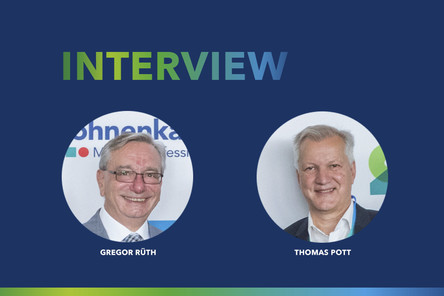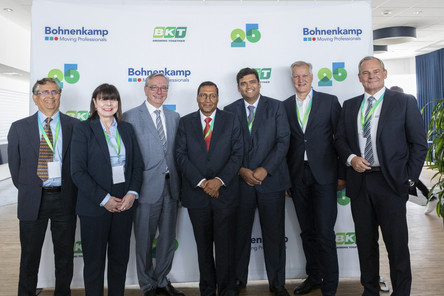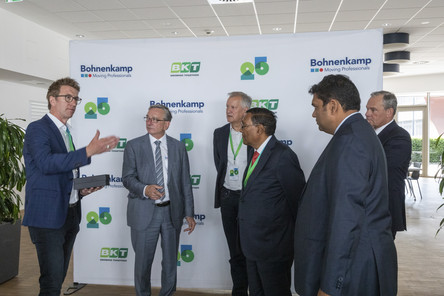Question: Bohnenkamp and BKT are closely linked due to their long and very successful time together. What was it like back in the early days?
Thomas Pott: I have been with the company for 40 years and was responsible for the original equipment sector 25 years ago. When our former purchasing manager brought up the topic of tyres from India, it wasn't easy at first. Manufacturers and farmers were not quite as critical of the small diagonal tyres, but they were still in demand. In a certain way, BKT's name has helped us. Some customers have interpreted the name BKT as an abbreviation for Bohnenkamp Tyres. I'm not sure whether every salesperson has always contradicted this or whether one or the other has simply taken advantage of this dynamic. However, the good quality of the tyres quickly became known in the market, so we never really needed this extra benefit to convince people anyway.
Question: The commencement of the partnership between Bohnenkamp and BKT simultaneously marks the beginning of a phase of unprecedented growth for Bohnenkamp. Between 2008 and 2015, tyre sales - measured in containers - doubled.
Gregor Rüth: Yes, that's correct. We then began to align our location here in Osnabrück with these growth requirements. The entire site has been remodelled since the year 2012 and the storage capacity has been expanded to 90,000 square metres as of today. By the way, our current Defence Minister Boris Pistorius was present at the foundation stone laying, when he was still the mayor of Osnabrück. While BKT significantly expanded its production capacities, we then expanded our European presence as a distribution partner in many countries together with BKT: the Benelux countries in 2010, our subsidiaries in Austria and Switzerland in 2013 and 2014 and finally the takeover of the trading business of STARCO in 2016 - including the companies in Eastern Europe as well as in Denmark and Sweden; these all mark important milestones during this time.
Question: How has this development affected the supply?
Thomas Pott: We have consistently opened up new segments with BKT: diagonal, radial, special IF/VF tyres, then earthmoving, industry and crane. That alone requires significantly more space. And then the range of vehicles in the different sectors has also continued to grow. The vehicles are getting bigger, heavier and more specialised. And they constantly need different tyres, which leads to a significantly expanded range. At the same time, however, the existing vehicles remain in operation for a very long time. That means that as a full-range supplier, we also have to keep tyres in stock for older machines. Looking back, we have added between 80 and 100 new products to our range every year. At the same time, I can count on one hand the tyres that have disappeared from the range. All of this naturally affects storage capacities.
Question: That sounds like a mammoth task!
Thomas Pott: Establishing Bohnenkamp as a supplier in other areas was not an easy step, yet it was a logical one. We observed that the different areas of agriculture, earthmoving and transport are becoming more and more intertwined: on almost every construction site on the motorway, tractors with loading trolleys are used, while you can increasingly find wheel loaders or trucks in agriculture. Thus, it was only logical to offer all solutions from a single source to our established and new customers.
Question: Do components for vehicle construction still play a role in Bohnenkamp's business?
Gregor Rüth: Yes, these are our roots, which we have never lost sight of. Our founder, Friedel Bohnenkamp, established the company here in Osnabrück in 1950 with a focus on trading vehicle components. We are still the right supplier for axles, slewing rings, brake systems and all relevant components from tyres to the complete chassis and brake system, especially for small and medium-sized machine builders. At the start, tyres were just another component for Friedel Bohnenkamp that fitted in with the existing vehicle construction elements. At the same time, he also saw the sales potential that lies in tyres and wheels. And so we have evolved into one of the leading tyre wholesalers in off-highway and transport over the last seven decades.
Question: Bohnenkamp still focuses exclusively on the specialist trade. Competitors are now going one step further and distributing the products to the end user through their own trade organisations. Given the sales potential lying dormant here, doesn't it make sense to also sell to consumers and serve large trading platforms?
Gregor Rüth: A very clear no! We truly feel obligated to wholesale activities. We are partners of our business customers. We do not conduct B2C business and do not serve any trading platforms. Our customers can continue to rely on this in the future! All the positive business developments, in our view, serve as evidence that our chosen path so far is the correct one, and that our values of customer proximity, sustainability and being down to earth are paying off.
Question: Customer proximity is the catchphrase I would like to pick up on first. How is customer proximity demonstrated at Bohnenkamp?
Thomas Pott: In Germany alone, we have almost 100 staff who are in direct contact with customers. The foundation of our success is our great understanding of what wheels and tyres must achieve. But above all, we endeavour to understand the needs of our customers and make a suitable offer. Ultimately, the success of our customers is the basis for our business. As a result, our customer relationships are consistently long-lasting, which means over many years and in most cases have even lasted for decades. For this, however, they must constantly offer added value.
Question: What added values are you referring to?
Thomas Pott: Firstly, we have a large and capable team. With nearly 100 employees in customer contact, Bohnenkamp undoubtedly offers one of the largest service teams for special tyres in Europe. In addition, we have expanded the additional service areas for our customers. Our goal is to provide them with a 360-degree service for tyres and wheels in the off-highway & transport sector.
When we look at the service innovations ahead, we will be offering our customers a new tyre disposal service quite soon, and this will be nationwide. Together with certified recycling partners and the support of BKT, we want to ensure proper disposal and stand by our customers as the one central point of contact - and also share the costs.
Question: Digital services are also becoming increasingly important - if digitalisation is the measure of fitness for the future - how fit is Bohnenkamp?
Gregor Rüth: Over the last few years, we've made substantial investments to digitise our processes and overall working methods in a structured way - for instance, by implementing a CRM system for better customer orientation or a group-wide PIM system, which has significantly improved the data quality of our more than 20,000 products. In the field of logistics, we have optimised all our locations with warehouse management systems over the past few years, and we now also use scheduling tools in procurement to determine the optimal order quantities. Coinciding with Agritechnica this year, we will also launch a completely revamped online shop, which offers many new and forward-looking opportunities. In the field of web technology, we have introduced the new software tool, LOBSTER. With this, we can implement individual customer interfaces much faster in the future.
Question: Does expert and experiential knowledge still play a role in the era of digitalisation?
Thomas Pott: It's very important. Particularly in the area of special wheels and tyre changing, experience is key. Many of my colleagues, like myself, have been here for many years, and there is hardly anything they haven't encountered yet. This ultimately means that we are not only able to sell tyres and wheels, but also offer our customers the appropriate service before and after the purchase. This starts with the development of machines. At OE, we are often already involved in the development of a machine and can, if necessary, also develop the wheel that matches the rim and tyre manufacturers. And even after delivery, we support the trade through joint deployment consultations at the customer's location, our own complaints service and, in the future, also our own disposal service. So, we continue to move forward in order to not only offer our customers the widest range of products in the future but also the best service by far.



